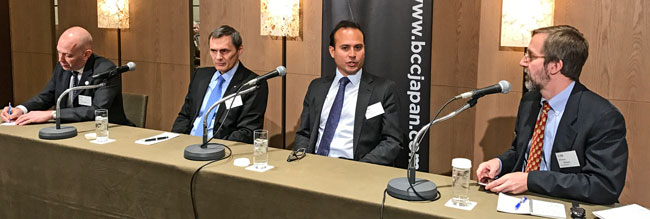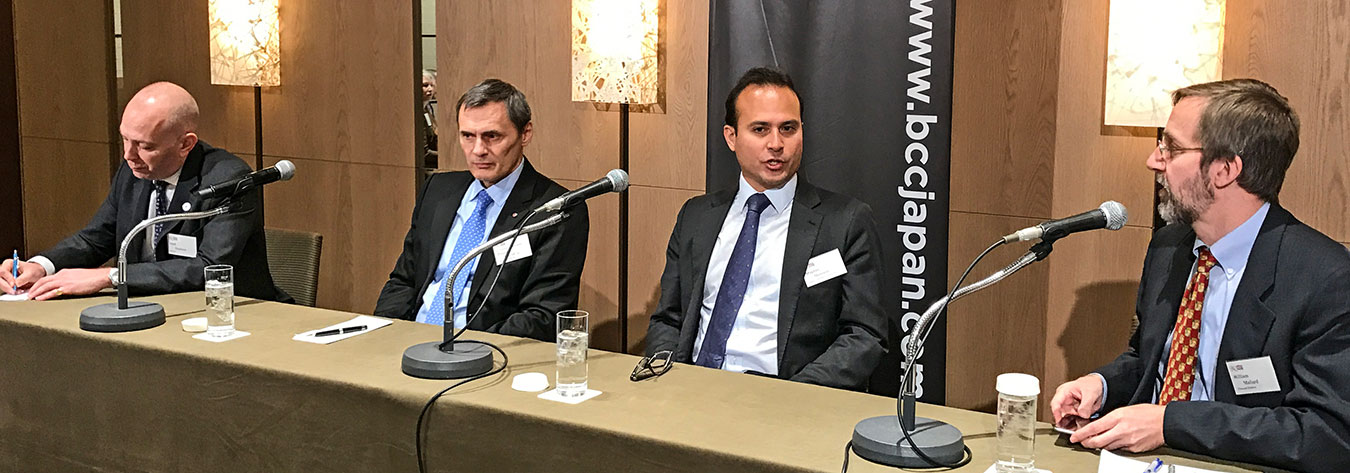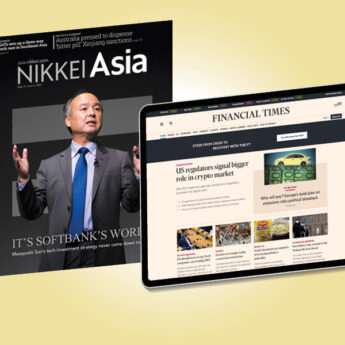From Brexit to the election of US President Donald Trump, 2016 was a year of shocks that challenged conventional wisdom and accepted patterns of business. Although previously the post-World War II international order largely had seemed secure, it has begun to fray.
With the resultant uncertainty, the response of the global business community will be decisive regarding what comes next. And to get an insight into what top executives are thinking, the British Chamber of Commerce (BCCJ) in Japan held its 2017 Business Trends from the C-Suite event at the Grand Hyatt Tokyo in Minato Ward, on 1 February. On the panel were Magnus Hansson, chief executive officer of Jaguar Land Rover Japan; Philippe Fauchet OBE, president of GlaxoSmithKline K.K. and member of the BCCJ Executive Committee; and Mark Dearlove, chief executive officer of Barclays Japan.

From left: Mark Dearlove; Philippe Fauchet OBE; and Marcus Hansson
Uncertainty was a watchword during the discussions. From a business perspective, much of the ambiguity is tied to questions related to future trading conditions, and this encompasses Trump’s proposed, but ill-defined, border tax, and the UK’s as yet undecided post-Brexit relationship with Europe. Regarding these matters, Hansson commented that, “We need clarity on this as quickly as possible”.
However, with political developments rocking several Western democracies, that clarity might not come soon. But by contrast, Japan—a country that from 2007 to 2012 saw a new prime minister each year—has become a paragon of political stability.
“When I look around the world and see what’s happening with Brexit, with Europe, etc., actually Japan looks like a pretty good place to be, and a pretty good place to be involved with”, said Dearlove.
Currency valuations are also adding to the unclear situation, particularly since the topic is becoming increasingly politicised as Trump seeks to reset the US trade relationship with its major partners, including Japan.
“In our business, volatility is good for us; but uncertainty is a real challenge, and I think that’s what we face now”, said Dearlove.
“I also wonder, these days—given that the markets are so big and so liquid—how much jawboning can actually affect currency”, he said, noting that the yen–dollar exchange rate could see significant swings.
These currency debates are also affecting the UK’s situation, with the collapse of sterling having followed the referendum decision last year. In Fauchet’s view that, combined with the current strength of the dollar, could see British firms, “become easy targets for some predators with a lot of money and some support from their president. So [this situation] may create some protectionism trends around the world”.
Protectionism
In the present unclear trade environment, the motor manufacturing industry has emerged as a particularly contentious and vulnerable sector. Three Japanese automakers use the UK as a base in which to build motors, before exporting them to the rest of the European Union (EU), and Trump has specifically identified Japan as an unfriendly market for US manufacturers.
Hansson noted that this is because of the sheer scale of capital and employment in the sector. In addition, it is familiar to the general public.
“It stirs emotions and it’s a topic that fits particularly well the points that President Trump wants to make. And it’s something that fits particularly well with his overall rhetoric—simple answers to complicated questions”, he said.
“As a matter of fact, the United States actually … has more barriers to importation than Japan does”, he said, citing the so-called “chicken tax”—a 25% tariff on light trucks imported into the United States—that is a hangover from a chicken-related trade war in the 1960s.
“That is obviously something the president isn’t too keen to talk about, but it’s true”, he added.
From Japan’s perspective, this makes Trump’s comments confusing.
“If you come back to the basic point—‘Is Japan closed or not?’ No, it’s not”, said Hansson.
Indeed, every market has regulations that firms need to contend with, such as those on fuel economy, he pointed out.
“The real difficulty in Japan, which I’m sure all of us have experienced, is the difficulty to compete in Japan, and that’s a completely different thing.
The reason for the much lower sales of US cars “is, frankly, nothing more than a total lack of effort”, he said, pointing to a lack of product localisation, poor fuel economy—an important point for Japanese consumers—and weak distribution and marketing efforts.
“How many American cars are sold in Europe? Not many. Same problem: lack of effort”.
Brexit
With the UK’s looming exit from the EU and probably also the single market, UK-based firms are having to contend with the emergence of new barriers to doing business. For the finance sector, that means the loss of so-called passporting rights, which allow banks and other firms to sell their products and services across the European Economic Area from London. That could see banks heading for the exit, but Dearlove argued that London would retain its preeminent status as a financial hub.
“If you think about the infrastructure that goes around the city, whether it be the financial services industry, the lawyers, the accountants, a lot of business is done under English law, [which makes it] quite difficult to pull up and move”, he said. “Also the UK, with the weakening of the pound, is a pretty interesting place to do business”.
Nonetheless, firms are still in wait-and-see mode, with Brexit negotiations yet to begin in earnest.
“As we say to all of our customers, you need to have contingencies to prepare for the future”, Dearlove added.
The automotive industry has its own worries. UK-based manufacturers, including Jaguar Land Rover, have depended on the EU for supply chains, harmonised regulations and access to non-British workers with specific technical expertise.
“There’s no beating around the bush—we’re extremely concerned”, said Hansson. “But, on the other hand, strong businesses are able to respond to changing situations”.
Taking a stand
With so many contentious debates and policies in the UK and US, as well as in continental Europe, BCCJ ACUMEN asked the panel whether firms should take a clear public stance on business and ethical issues.
“My personal opinion is the company should be vocal”, said Hansson, pointing to assurances given by the UK government to Nissan, a vocal opponent of Brexit. “It probably does make sense to clarify what’s important for your enterprise”.
In addition, some of the new Trump administration’s policies, such as the executive orders banning visitors from some Muslim countries, mean that firms are finding themselves dragged into wider social debates.
“I think you have to balance the best interests of your employees, your shareholders and your long-term plans, but we are an equal opportunity employer and we want to attract the best and brightest”, said Dearlove.
“When it comes to the diversity [and lesbian, gay, bisexual and transgender] agenda, those are lines that I don’t think we’d compromise on. And there are certain things that certain governments may choose to do, and we should take a stand against those sorts of things”.







